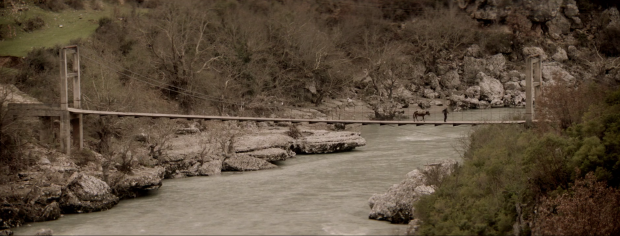Bujar Alimani’s award-winning The Delegation is set in 1990 Albania.
The 77-minute feature opens at a Gulag-like camp for political prisoners. Televised propagandistic news watched by the inmates reveals that this is a time of great change for the hard-line Stalinist nation. The following morning bearded dissident professor Leo (Viktor Zhusti), who has been serving a 16 or so year sentence as a supposed enemy of the people and has never met his teen aged daughter, is awakened by guards, shaved and transported to the capital. The true purpose of Leo’s summoning via an arduous jeep journey through the mountainous nation to Tirana eventually unfolds - and turns out to be of international significance.
Like most of the other countries participating in the South East European Film Festival Albania was located behind what we Yankee Doodle Dandies blithely called “the Iron Curtain.” However, unlike, say Romania, Bulgaria, Hungary or Poland, Albania was a lapsed member of the Warsaw Pact (Tirana withdrew from that military alliance in 1968), while former Yugoslavia never joined this East Bloc treaty largely designed to counter NATO.
Although countries such as the GDR (East Germany) and other pro-Russian “satellites” were under Moscow’s hegemony, in 1961 there was a Soviet-Albanian Split, which had to do with Nikita Khrushchev’s “revisionism” and other factors way beyond the parameters of this movie review that rather remarkably gave Chairman Mao’s People’s Republic of China a toehold in Eastern Europe under Albania’s hard-line leader, Enver Hoxha.
The aforementioned year of 1968 actually figures heavily in The Delegation, as this was the time of the Prague Spring, when the Warsaw Pact invaded Czechoslovakia to suppress the liberalization of Alexander Dubcek’s “Socialism with a human face” movement. To its credit, Albania refused to participate in this invasion - but The Delegation’s director Alimani and screenwriter Artan Minarolli appear to have learned much from the Czech New Wave of internationally acclaimed films that flourished before the Soviet tanks rolled across the border. According to IMDB.com, Bujar is, appropriately, “one of the most prolific and important writer/directors of the New Albanian Cinema.”
The Czechoslovak Movie Miracle included Milos Forman’s 1967 The Fireman’s Ball (which was Oscar-nominated for Best Foreign Film), Jiří Weiss’ (my film school mentor at NY’s Hunter and Richmond Colleges) 1967 Murder Czech Style and Jaromil Jireš’s 1969 The Joke, adapted from a novel by Milan Kundera (1984’s The Unbearable Lightness of Being). Although these works often had naturalistic styles reminiscent of “Socialist Realism” (which wasn’t “socialist or “realistic”, BTW), they were filled with dark comedy and were movie metaphors expressing the situations and contradictions faced by these Stalinist societies grappling with the challenges of change.
Similarly, The Delegation is a motion picture parable suffused with irony. While Leo represents a Dubcek-like dissenter, his ominous armed guard Asllan (Xhevdet Ferri) symbolizes the Stalinist past, while Spiro (Ndriçim Xhepa), who orders that Leo be unshackled during the long jeep ride and displays other courtesies to his prisoner, signifies party apparatchiks on the cusp of change. As the jeep’s driver, Kasem Hoxha seems to be an allegory for the working class, caught in the middle of the brewing faction fights as they do the actual labor required to make things happen. The dysfunction of the vehicle and later of the telephone at a village, as the riders try to make their way across the mountains towards distant Tirana, capture Albania’s incompetence and inefficiency under the Hoxha regime.
Meanwhile, presumably at Tirana, where the dissident and his captors are transporting him, the French-speaking head of the film’s titular delegation (Richard Sammel) reveals that he’s not a Frenchman at all, but rather an Albanian who escaped to France in that momentous year of 1968. He has been dispatched back to Albania on an important diplomatic task that seems to hinge on Leo - just as South Africa’s fate had depended on the destiny of that other political prisoner, Nelson Mandela. (It’s worth remembering that due to the “Velvet Revolution”, absurdist playwright Václav Havel went from being a political prisoner to first president of the Czech Republic.)
Despising plot spoilers, I won’t disclose what happens to Leo and his jailers during their mission en route to Tirana. But I imagine that like the mishaps in Forman’s The Fireman’s Ball it symbolizes the pitfalls Albania has confronted since the fall of its ancien regime and its destalinization struggle. Indeed, every character seems to embody a different layer of a society in flux, being engulfed by vast, sweeping change on the horizon.
The Founder and Director of the 14th annual SEEfest, Vera Mijojlic, introduced director Bujar Alimani before the Laemmle Music Hall screening, the North American premier of The Delegation, which won the Warsaw International Film Festival’s Grand Prix and two awards at the Trieste International Film Festival. Alimani took part in a Q&A after his movie was shown. I liked this tightly, tautly directed film that has a grim wit and dramatized 2019’s SEEfest theme of “Audacity in Cinema.” In addition, The Delegation opened a window on a remote Southeast European nation perched on the Adriatic Sea, which is one of the truly great things about SEEfest: Enabling Angelenos to literally see films from countries we in L.A. would otherwise probably never encounter onscreen or in person, and the movies they produce.
For more info about the South East European Film Festival, which runs through May 8, see: https://seefilmla.org/.
ALOHA OE, JOHN SINGLETON. FAREWELL TO THEE, ONE OF THE GREATS.

